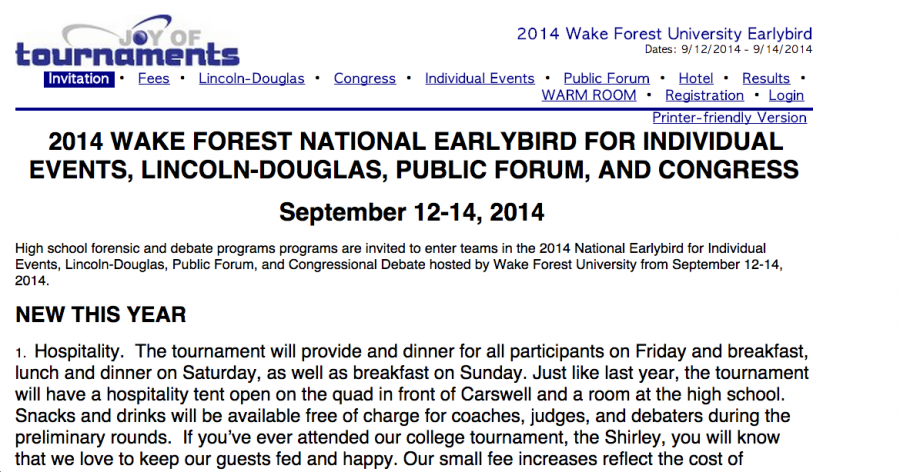Debate teams compete in Wake Forest National Earlybird tournament
Photo courtesy of http://www.joyoftournaments.com/nc/wfu-earlybird/info.asp. More information about the Wake Forest tournament can be seen on the website.
September 20, 2014
Beginning a new season of the national high school debate program, the Wake Forest National Earlybird tournament was held on Sept. 12-14 at Wake Forest University. Members of Jefferson’s Congressional Debate (Congress), Lincoln-Douglas (LD) and Public Forum (PF) teams participated in the tournament, bringing back positive results.
In the varsity LD division, senior Shreyas Garg and juniors Jay Gupta, Aneesh Reddy, Kunal Shroff and Kaushik Venkatesh competed in six preliminary rounds against students from teams across the nation. Based on the preliminary results, Garg and Gupta scored 4-2, advancing to the elimination rounds.
In the junior varsity (JV) division, juniors Allen Cheng, Kevin Livingstone, Sahith Malyala and Ashwin Sivakumar and sophomores Aakash Shukla and Vishal Tandale brought outstanding results to the team, with Cheng, Livingstone, Malyala and Shukla qualifying to compete in the elimination rounds.
Cheng and Garg broke to finals and semifinals, respectively.
“While competing in the finals and all throughout the elimination rounds, I was more nervous than I’d ever been before in a debate,” Cheng said. “Still, I’d really only gone to the tournament to gain more experience in debate, so I was happy even losing.”
LD debate discusses the pros and cons of a resolution chosen periodically during the year. At Wake Forest, students presented and defended their positions on the organ procurement of the dead. Competitors are required to collect evidence and files that are used to support their arguments during debate rounds.
Additionally, Congress, a newly introduced debate program at Jefferson, initiated its first year with the club’s co-captains, junior Virginia Sun and sophomore Victoria Bevard competing in the tournament. Unlike the strict one-to-one or pair-to-pair debate format, members of Congress engage in an open debate of multiple participants who present their own legislation on a specific topic.
After a preliminary debate, Bevard advanced to the Super Congress, in which the highest-ranked debaters from the previous rounds were selected to attend. During the debate, students presented and argued against possible amendments to the Omnibus Spending Bill, which ranged from National Security to Education.
“Congressional debate is different because at each competition, we prepare for many different topics and write our own legislation,” Sun said. “For example, if your given topic was Bitcoin, any competitor could write a legislation legalizing, outlawing, restricting, etc. Bitcoin.”
Congress will be open to Jefferson students during eighth period on Friday A-blocks. Bevard and Sun will lead the club by introducing topics related to the debate and encouraging students to participate in regional and national circuit tournaments.
“I hope to lead the club with co-founder Victoria Bevard by exposing the Congressional Debate form to students who are interested in American politics, government and public speaking,” Sun said.
Twelve members of the PF team also participated in the competition by pairing up in six teams. After six preliminary rounds, seniors Deepanshu Singh and Sudhamsh Tippireddy and juniors Jeffrey Xia and Danny Wang scored 4-2. Unfortunately, none of the PF teams qualified to compete in the elimination rounds.
The competitive debate season will continue with the upcoming regional Washington-Arlington Catholic Forensic League (WACFL) and other national tournaments. The first WACFL tournaments for Policy and LD debate is tentatively scheduled for Oct. 11, while the Congress and PF debate tournaments will be held on Oct. 18. Forensics will also be opening its WACFL season on Oct. 25. Until the regional circuit tournaments begin, Jefferson’s debate and Forensics teams will be rigorously preparing for the tournaments, welcoming new members and teaching new skills.
“Debate gives both sides of the argument, deepening our understanding of the real-word,” Livingstone said. “For example, one of our topics in the past was about how the US should extend universal health care to everyone. At first glance it might seem like the obvious answer seems like ‘yes, you should’, but as you analyze the topic, you find that there are many reasons to negate this.”







Some Person • Sep 23, 2014 at 8:20 pm
The article about debate was much better than expected. I am in debate for another high school in NoVa and my school’s newspaper and yearbook staff both have no clue about writing for debate. And we even have a bigger team then TJ (BR)! Congratulations on having such a good newspaper that showed up as the second result in a google search.